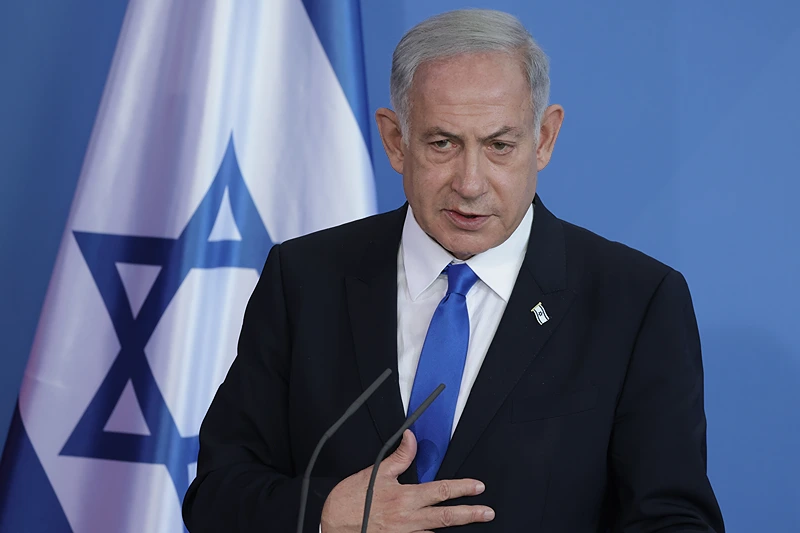
OAN Brooke Mallory
UPDATED 4:04 PM – Monday, March 27, 2023
The largest labor union in Israel has announced a momentous walkout on Monday in opposition to Prime Minister Benjamin Netanyahu’s proposed judicial overhaul, sending the country’s political turmoil into uncharted territory.
A number of government ministries, the nation’s three largest cities, banks, ports, and numerous other businesses and organizations went on strike on Monday, according to Israel’s Histadrut trade union, which also announced that critical services like hospitals and firefighters would operate on a Saturday schedule.
The strike caused all takeoffs from Israel’s primary airport, Ben Gurion Tel Aviv, to be suspended for a number of hours.
Certain universities closed their doors, the largest port in the nation, Haifa, and some of the most well-known retailers in the nation, including McDonald’s and the mall chain Azrieli Group, announced closures as well.
After employees and some diplomats joined the strike on Monday, a number of Israeli embassies, including those in Washington, D.C., London, and Paris, closed down.
On Sunday, following Netanyahu’s dismissal of Defense Minister Yoav Gallant, who became the first cabinet member to demand a halt to the reforms, the strikes were officially announced.

In response to the news regarding Gallant, widespread, unplanned demonstrations with citizens waving Israeli flags and screaming “democracy” erupted late Sunday night in Tel Aviv, Israel.
In the city’s major thoroughfare, protesters set a number of fires, and they also blocked a number of streets and bridges, including the Ayalon Highway.
Netanyahu has not spoken publicly since he fired Gallant, despite expectations in Israeli media that he would on Monday. Instead, he posted a brief tweet in which he urged demonstrators to behave responsibly.
“I call on all the demonstrators in Jerusalem, on the right and the left, to behave responsibly and not to act violently. We are brotherly people.”
For months, hundreds of thousands of Israelis have protested against the proposed judicial amendments that would give the ruling parties greater power over the country’s judiciary.
Former Israeli Prime Minister Yair Lapid called the decision to fire Gallant a new low and urged Netanyahu to change his mind.
Netanyahu may be able to fire the minister, but he “cannot fire the people of Israel who are standing up to the insanity of the coalition,” he said on Twitter.
“We’ve never been closer to falling apart. Our national security is at risk, our economy is crumbling, our foreign relations are at their lowest point ever… We don’t know what to say to our children about their future in this country. We have been taken hostage by a bunch of extremists with no brakes and no boundaries,” Lapid continued.
During a speech on Saturday night, when Netanyahu was away from the country on an official trip to the United Kingdom, Gallant urged for a halt to the judicial reforms. In opposition to the proposals, which detractors claim would erode the independence of the judiciary, several military reservists have vowed to resign from their positions.
According to Gallant, moving forward with the ideas could put Israel’s security in a dangerous predicament.
A number of well-known authorities demanded that the judicial reform process be put on hold as a result of his removal and the widespread demonstrations that followed.
Israel’s President Isaac Herzog urged Netanyahu and his administration to halt the plans right away in a Facebook post on Monday.
“Deep concern hovers over the entire nation. Security, economy, society – everyone is threatened,” said Herzog in the statement.
“The eyes of all the people of Israel are on you. The eyes of all the Jewish people are on you. The eyes of the whole world are on you. For the sake of the unity of Israelis, for the sake of committed responsibility I call on you to halt the legislative procedure immediately.”
On Monday, more than two dozen Israeli mayors declared a hunger strike over the judicial change.
“Starting tomorrow morning, [we] are launching a hunger strike in Jerusalem opposite the prime minister’s office, demanding an end to the huge crisis and the disaster that Israel is hurtling towards, to prevent the security of the country being affected and for the sake of togetherness and unity of the country,” proclaimed Mayor of Herzliya Moshe Fadlon.
27 delegates who represented a wide range of local authorities around the nation signed the statement.
Netanyahu is coming under increasing criticism from his own party in the midst of the protests.
All three of Netanyahu’s Likud party’s ministers, Minister of the Economy Nir Barkat, Minister of Culture and Sports Miki Zohar, and Minister of Diaspora Relations and Social Equality Amichai Chikli, recommended that the prime minister halt the legislation on Monday.
Former Jerusalem Mayor Barkat advised Netanyahu to pause and reassess his reform agenda since it had taken the nation dangerously close to civil conflict.
“The reform is necessary and we will do it – but not at the cost of a civil war,” Barkat said.
Some of the reform’s staunchest supporters even seemed to be changing their minds.
On Monday, Yariv Levin, the justice minister who campaigned for the change to be passed, left open the potential of a postponement.
“I will respect any decision that Prime Minister Netanyahu makes regarding legal reform legislative procedures… This is with the knowledge that a situation in which everyone does what he feels like, may immediately lead to the fall of the government and the collapse of the Likud,” said Levin, a member of Netanyahu’s Likud party.
In his statement on Saturday, Gallant referenced the unwillingness of certain Israel Defense Forces (IDF) reservists to train as evidence that the suspension was required “for the security of Israel.”
Following his firing, Gallant reaffirmed that view in a tweet on Sunday, saying that “The security of the State of Israel has always been and will always remain the mission of my life.”
According to the suggestions, the Supreme Court’s rulings would no longer be binding on Parliament, and the government would be in charge of selecting judges.
The measures, according to the administration, are necessary to control the Supreme Court, which they view as exclusive, elitist, and no longer speaking for the majority of Israeli people.

